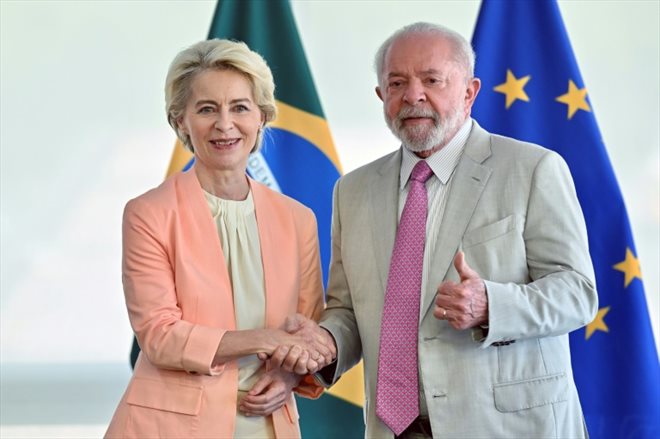European Commission President Ursula von der Leyen receives Brazilian President Luiz Inacio Lula da Silva in Brussels on July 17, 2023 (AFP/Jean-Christophe VERHAEGEN)
The leaders of EU countries are meeting with their counterparts from Latin America and the Caribbean for two days in Brussels to try to strengthen their ties, despite differences in particular on the war in Ukraine.
“I welcome the return of Brazil as a major player on the international scene,” said European Commission President Ursula von der Leyen on Monday morning, welcoming Brazilian President Luiz Inácio Lula da Silva. “We need our close friends by our side in these uncertain times,” she added.
This is the third EU-Community of Latin American and Caribbean States (CELAC) summit. The last was in 2015, and both sides are trying to make up for lost time. But the rapprochement is not without difficulties.
Disagreements emerged from the start of negotiations on a joint declaration, in particular because of the willingness of Europeans to mention the war started by Russia in Ukraine.
The EU is seeking to rally as much international support as possible against Moscow, but the 33 Latin American and Caribbean countries do not have a common position on the issue, and do not want to see this subject monopolize the discussions.
The intervention of Ukrainian President Volodymyr Zelensky at the summit, a time anticipated, will ultimately not take place.

Ukrainian President Volodymyr Zelensky at the NATO summit on July 12, 2023 in Vilnius, Lithuania (AFP/LUDOVIC MARIN)
“Our objective (…) is that all the countries of the region support Ukraine, provide support to the Ukrainian government at least in their declarations, to point out the violations of international law with which the country is confronted” , we say at the Elysée.
Brazil has refused to supply arms to Ukraine or impose sanctions on Vladimir Putin’s Russia.
Lula sparked controversy by repeatedly asserting that responsibility for the conflict was shared, even as he condemned the Russian invasion of Ukraine. And countries like Cuba and Venezuela remain allies of Moscow.
In a brief statement on Monday morning, the Brazilian president did not say a word about Ukraine, focusing his speech on the climate issue.
The fight against the exploitation of the Amazon rainforest is one of the main objectives of his government, contrary to the policies of his predecessor Jair Bolsonaro.

Deforestation in the Brazilian Amazon (AFP/STAFF)
It aims to end illegal deforestation by 2030.
The summit “is not going to be easy,” said Mexican Foreign Minister Alicia Barcena on Friday, who will represent her country in Brussels in place of leftist President Andres Manuel Lopez Obrador.
She cited among the difficult subjects a recent European Parliament resolution denouncing the human rights situation in Cuba.
The EU also has particularly tense relations with the Nicaragua of Daniel Ortega, since the repression of the demonstrations of 2018, and with the Venezuela of Nicolas Maduro since the contested re-election of the latter.
Some of the CELAC countries also requested that the final declaration mention the issue of reparations for the slave trade.
– Coveted lithium –
On the trade side, the question of the free trade agreement with Mercosur (Brazil, Argentina, Uruguay and Paraguay) will hover over the summit, even if no breakthrough is expected.
This agreement was concluded in 2019, after more than 20 years of complex negotiations, it was not ratified due in particular to European concerns over the environmental policies of Jair Bolsonaro.
Spain, which holds the six-month EU presidency, is hoping for ratification by the end of the year.

European Commission President Ursula von der Leyen on June 13, 2023 in Buenos Aires, Argentina (AFP/Archives/JUAN MABROMATA)
Ahead of the summit, Ursula von der Leyen toured the region in mid-June (Brazil, Argentina, Chile and Mexico), where she announced increased European investment, to ten billion euros, through the “Global Gateway” strategy intended to counter the influence of the Chinese “New Silk Roads” program.
She also announced the signing of a memorandum of understanding with Argentina on essential raw materials, in particular lithium, essential for the manufacture of batteries for electric cars.
An essential metal for the EU’s decarbonization strategy, which will ban the sale of new cars with combustion engines from 2035.
Argentina is one of the main world producers of this ore and forms with Bolivia and Chile the “lithium triangle”, with nearly 56% of world reserves.

Aerial view of brine ponds and processing areas of a lithium mine in Calama, on September 12, 2022 in the Atacama Desert, Chile (AFP/Archives/Martin BERNETTI)
A memorandum of understanding must also be signed Tuesday with Chile, in the presence of President Gabriel Boric.
Bolivia announced at the end of June that China and Russia would invest $1.4 billion to open two lithium mines in the country.
Alongside this meeting of around sixty Heads of State and Government, the People’s Summit will take place in Brussels on Tuesday and Wednesday, with around a hundred movements, left-wing parties and associations from both sides of the Atlantic.
© 2023 AFP
Did you like this article ? Share it with your friends with the buttons below.




